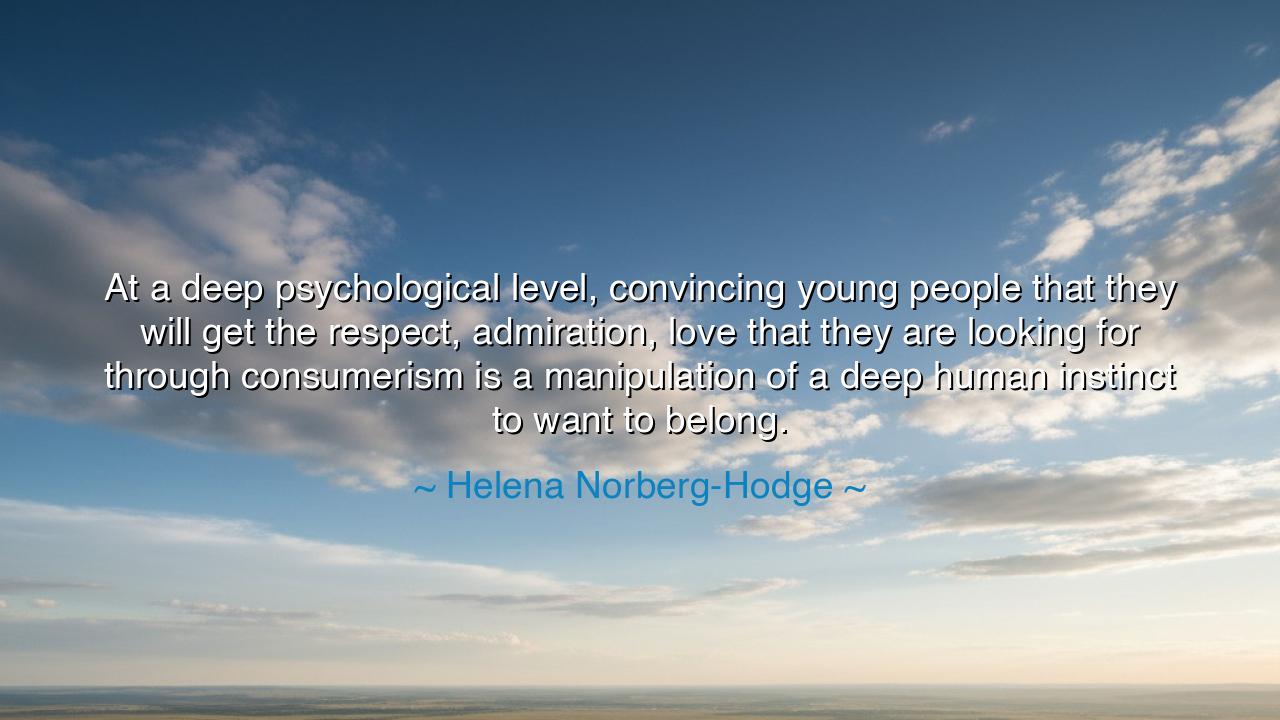
At a deep psychological level, convincing young people that they
At a deep psychological level, convincing young people that they will get the respect, admiration, love that they are looking for through consumerism is a manipulation of a deep human instinct to want to belong.






In the voice of quiet truth, Helena Norberg-Hodge, the scholar and advocate for human-scale living, once spoke these words of warning and wisdom: “At a deep psychological level, convincing young people that they will get the respect, admiration, love that they are looking for through consumerism is a manipulation of a deep human instinct to want to belong.” Within these words lies not only a critique of the modern world, but a lament for the loss of our most sacred connection — our belonging to one another, to community, and to the living earth itself. For what she calls consumerism is not merely the act of buying; it is the worship of illusion, the replacement of love with possession, and the corruption of our deepest human longing for acceptance and belonging.
Norberg-Hodge, who spent years among the people of Ladakh in the high Himalayas, saw with her own eyes the difference between communities built on relationship and societies consumed by material desire. In the villages she studied, people were rich in laughter, trust, and interdependence, though poor by the standards of the modern world. But when globalization reached their valleys, advertisements soon followed — bright images whispering to the young that happiness could be bought, that identity could be worn, that respect could be earned through appearance. She saw how this messaging manipulated a sacred instinct — the human need to belong — twisting it into a tool for profit. Where once belonging was found in friendship, family, and shared work, it was now sought in brands, in competition, and in the hollow prestige of wealth.
To say that this is manipulation is to see how consumer culture has learned to mimic love. The marketplace tells the young: “Buy this, and you will be admired. Own that, and you will be loved.” It promises them the comfort of belonging, but delivers only the loneliness of comparison. For no object, however beautiful, can fill the emptiness of disconnection. The ancient philosophers knew this truth well. Epicurus, who lived centuries before our modern age, taught that happiness arises not from luxury, but from friendship, simplicity, and peace of mind. To crave endlessly is to become enslaved, he warned; to live contentedly among others is to be free. Yet today, as Norberg-Hodge observes, our societies teach the opposite — that identity and worth are built not by who we are, but by what we own.
Consider the story of the youth of postwar Japan, who, after the devastation of conflict, were promised a new kind of life — one of consumption, technology, and luxury. In the decades that followed, Japan became a symbol of prosperity, yet among its younger generations, alienation grew. The rise of what is now called the hikikomori — those who withdraw entirely from society — reveals the tragic cost of seeking belonging through material means. When relationships are replaced by possessions, and purpose by status, the soul starves even as the body is surrounded by abundance. The same pattern echoes across the modern world — a quiet epidemic of loneliness hidden beneath the glittering surface of consumer success.
What Norberg-Hodge names so clearly — the manipulation of belonging — is one of the most profound psychological forces of our time. The longing to belong is ancient, carved into our very nature by the need to survive together. In the tribe, the village, the family, belonging was once guaranteed through contribution, kindness, and courage. But now, corporations exploit that longing, selling false symbols of unity — the logo, the fashion, the gadget — that divide rather than unite. It is a subtle enslavement, for it teaches us to seek love where it cannot be found. And when the illusion fades, we are left restless, uncertain, always reaching for the next purchase to soothe the ache of isolation.
Yet her words are not only a critique — they are a call to remembrance. For within every human being still lives the power to reclaim authentic belonging. True belonging, Norberg-Hodge teaches, cannot be bought; it must be built — through compassion, community, and shared purpose. It is found when we work together, eat together, create together, and care for one another as parts of a greater whole. When we look into another’s eyes and see not competition but kinship, we step out of the cycle of manipulation. To resist consumerism, then, is not merely to reject materialism — it is to restore the sacred bond between people and planet, to remember that love is not a product but a practice.
So, dear listener, let these words guide you: do not let your heart be sold. Seek not the approval of the world, but the connection of souls. Turn your gaze from the screen to the sky, from the mall to the meadow, from the glitter of possessions to the light of genuine friendship. Build communities of belonging wherever you stand — families that cherish presence over property, friendships that value laughter over luxury. Teach the young that love and respect are not earned through things, but through character, kindness, and service.
For as Helena Norberg-Hodge reminds us, the hunger for belonging is holy — but when misused, it becomes our greatest weakness. Let us, then, reclaim it as our greatest strength. Let us belong not to brands, but to one another. For only in connection, simplicity, and love shall we find the nourishment that no marketplace can offer, and the peace that no possession can replace.






AAdministratorAdministrator
Welcome, honored guests. Please leave a comment, we will respond soon